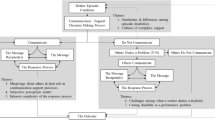Abstract
Purpose Within large and complex organizations work disability (WD) communication bottlenecks emerge and contribute to avoidable disability days. Our study utilized soft systems methods to better understand communication problems in WD management. Methods Semi-structured interviews were conducted with disability case managers (n = 10), frontline supervisors (n = 15) and human resource/labor relations specialists (n = 5) within three public service organizations. Interview questions asked about organizational WD system structure and communication practices. Thematic analysis was conducted to examine system structure and emergent communication bottlenecks. Results WD communication took place across a number of internal and external stakeholders. Communication bottlenecks tended to concentrate within WD case manager and frontline supervisor activities. Inconsistent communication across organizations, challenges interacting with external stakeholders, mental health disability information exchange, lack of WD communication experience and previous worker performance represented communication bottlenecks that contributed to avoidable disability days. Conclusions To strengthen communication practices, systems-focused responses towards organizational WD management are required.
Similar content being viewed by others
References
Franklin GM, Wickizer TM, Coe NB, Fulton-Kehoe D. Workers’ compensation: poor quality health care and the growing disability problem in the United States. Am J Ind Med. 2015;58(3):245–251.
Franche R-L, Baril R, Shaw W, Nicholas M, Loisel P. Workplace-based return-to-work interventions: optimizing the role of stakeholders in implementation and research. J Occup Rehabil. 2005;15(4):525–542.
Young AE, Wasiak R, Roessler RT, McPherson KM, Anema J, Van Poppel MN. Return-to-work outcomes following work disability: stakeholder motivations, interests and concerns. J Occup Rehabil. 2005;15(4):543–556.
Baril R, Clarke J, Friesen M, Stock S, Cole D. Management of return-to-work programs for workers with musculoskeletal disorders: a qualitative study in three Canadian provinces. Soc Sci Med. 2003;57(11):2101–2114.
MacEachen E, Kosny A, Ferrier S, Chambers L. The, “toxic dose” of system problems: why some injured workers don’t return to work as expected. J Occup Rehabil. 2010;20(3):349–366.
MacEachen E, Clarke J, Franche R-L, Irvin E. Systematic review of the qualitative literature on return to work after injury. Scand J Work Env Health. 2006;2006:257–269.
Jetha A, Lamontagne AD, Lilley R, Hogg-Johnson S, Sim M, Smith P. Workplace social system and sustained return-to-work: a study of supervisor and co-worker supportiveness and injury reaction. J Occup Rehabil. 2017;28:486–494.
Linton SJ, Boersma K, Traczyk M, Shaw W, Nicholas M. Early workplace communication and problem solving to prevent back disability: results of a randomized controlled trial among high-risk workers and their supervisors. J Occup Rehabil. 2016;26(2):150–159.
Shaw WS, Robertson MM, McLellan RK, Verma S, Pransky G. A controlled case study of supervisor training to optimize response to injury in the food processing industry. Work. 2006;26(2):107–114.
Pransky G, Shaw WS, Loisel P, Hong QN, Désorcy B. Development and validation of competencies for return to work coordinators. J Occup Rehabil. 2010;20(1):41–48.
Kosny A, Franche R-L, Pole J, Krause N, Côté P, Mustard C. Early healthcare provider communication with patients and their workplace following a lost-time claim for an occupational musculoskeletal injury. J Occup Rehabil. 2006;16(1):25–37.
Kilgour E, Kosny A, McKenzie D, Collie A. Interactions between injured workers and insurers in workers’ compensation systems: a systematic review of qualitative research literature. J Occup Rehabil. 2015;25(1):160–181.
Jetha A, Pransky G, Hettinger LJ. Capturing complexity in work disability research: application of system dynamics modeling methodology. Disabil Rehabil. 2016;38(2):189–194.
Jetha A, Pransky G, Fish J, Hettinger LJ. Return-to-work within a complex and dynamic organizational work disability system. J Occup Rehabil. 2015;26:276–285.
Jackson MC. Systems thinking: creative holism for managers. Chichester: Whiley; 2003. p. 378.
Sterman JD. Business dynamics: systems thinking and modeling for a complex world. New York: McGraw-Hill; 2000.
Homer JB, Hirsch GB. System dynamics modeling for public health: background and opportunities. Am J Public Health. 2006;96(3):452–458.
Leveson NG. Applying systems thinking to analyze and learn from events. Saf Sci. 2011;49(1):55–64.
Collie A, Newnam S, Keleher H, Petersen A, Kosny A, Vogel AP, et al. Recovery within injury compensation schemes: a system mapping study. J Occup Rehabil. 2019;29(1):52–63.
Checkland P, editor. Systems thinking, systems practice. Hoboken: Wiley; 1981.
Loisel P, Durand MJ, Berthelette D, Vezina N, Baril R, et al. Disability prevention: new paradigm for the management of occupational back pain. Dis Manag Health Outcomes. 2001;9(7):351–360.
Miles MB, Huberman AM, Saldana J. Qualitative data analysis. Thousand Oaks: Sage; 2013.
QSR International Pty Ltd. NVivo qualitative data analysis software. 10. ed 2016.
Russell E, Kosny A. Communication and collaboration among return-to-work stakeholders. Disabil Rehabil. 2018. https://doi.org/10.1080/09638288.2018.1472815.
Roberts-Yates C. The concerns and issues of injured workers in relation to claims/injury management and rehabilitation: the need for new operational frameworks. Disabil Rehabil. 2003;25(16):898–907.
Shaw WS, Robertson MM, Pransky G, McLellan RK. Employee perspectives on the role of supervisors to prevent workplace disability after injuries. J Occup Rehabil. 2003;13(3):129–142.
Johnston V, Way K, Long MH, Wyatt M, Gibson L, Shaw WS. Supervisor competencies for supporting return to work: a mixed-methods study. J Occup Rehabil. 2015;25(1):3–17.
Acknowledgements
This research was supported by a Healthy and Productive Work Partnership Development Grant, Canadian Institutes for Health Research and Social Sciences and Humanities Research Council of Canada (Grant No. #890-2016-3001).
Author information
Authors and Affiliations
Contributions
All authors contributed to study conceptualization. AJ, BY and ML co-led data collection and analysis. AJ led manuscript development. CM, BY, ML contributed significantly to manuscript development and approved the final version published. Each author agrees to be accountable for all aspects of the work including accuracy and integrity of any part of the work.
Corresponding author
Ethics declarations
Conflict of interest
The authors declare no conflicts of interest.
Additional information
Publisher's Note
Springer Nature remains neutral with regard to jurisdictional claims in published maps and institutional affiliations.
Rights and permissions
About this article
Cite this article
Jetha, A., Yanar, B., Lay, A.M. et al. Work Disability Management Communication Bottlenecks Within Large and Complex Public Service Organizations: A Sociotechnical Systems Study. J Occup Rehabil 29, 754–763 (2019). https://doi.org/10.1007/s10926-019-09836-3
Published:
Issue Date:
DOI: https://doi.org/10.1007/s10926-019-09836-3




